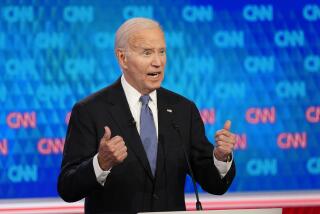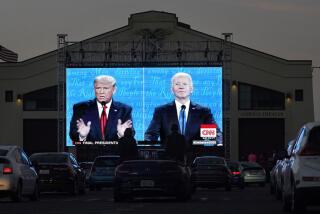Analysis:: Clinton and Sanders prepare for debate, and a new phase in the Democratic race
Reporting from TUCSON — Hillary Rodham Clinton was never going to waltz to the Democratic presidential nomination. The American political system doesn’t work that way.
No one, however, expected a 74-year-old senator from tiny Vermont to emerge at this point as her strongest challenger. Not the party’s wise men and women, not Clinton strategists. Not even the self-described Democratic socialist himself.
But Bernie Sanders’ stunning fundraising success — his $26-million haul nearly matched Clinton’s money machine over the summer — and his continuing capacity to draw huge crowds, including 13,000 Friday night in Tucson, seem to ensure he will stick around for months to come and, even if he falls short of the nomination, push Clinton and fellow Democrats in his leftward direction.
See the most-read stories this hour >>
In recent weeks, Clinton has staked a number of positions that narrowed the gap between the two: opposing the Keystone XL pipeline, proposing tougher regulation of Wall Street, rejecting a trade deal she helped negotiate with Asian countries and calling for the repeal of a federal tax on high-end healthcare plans.
Clinton may have come to those positions of her own volition, but her timing ahead of Tuesday’s first Democratic debate appears to be no accident, just as her increased willingness to take on Sanders, albeit obliquely, hardly seems coincidental.
“Everything that I am proposing, I have a way to pay for it,” she said while campaigning last week in Iowa, no doubt mindful that Sanders’ platform, which includes a call for universal healthcare coverage and free college tuition, carries a hefty price tag.
“You’ve got a proposal,” Clinton challenged him, “tell us how you’re going to pay for it.”
SIGN UP for the free Essential Politics newsletter >>
Sanders’ response has been to welcome Clinton alongside. Professing delight at Clinton’s newfound opposition to the Trans-Pacific Partnership trade deal, Sanders allowed that “it would have been more helpful to have her aboard a few months ago” when he was one of the loudest and loneliest voices in opposition.
Clinton, 67, remains a solid favorite to win the Democratic nomination, in large part because of her strong support among women, Latinos and African Americans, who make up much of the party base. For all the talk of discontent, 3 in 4 likely Democratic primary voters view Clinton positively, and the same number say they could see voting for her regardless of who they now support, according to the latest Wall Street Journal/NBC poll.
But Sanders’ rise and Clinton’s struggle with controversies over her family’s philanthropic foundation and the use of a private email server as secretary of State have seeded deep doubts about the front-runner and raised questions about both her political durability and personal veracity.
That has encouraged Vice President Joe Biden to seriously weigh a lightning entry into the race, a move that would instantly transform the contest from a race to catch Clinton — pitting Sanders against former Maryland Gov. Martin O’Malley and the also-rans Lincoln Chafee and Jim Webb — into a brawl between the party’s two top heavyweights.
Many Democrats, perhaps envious of the boisterous GOP contest, are hankering for a fight.
NEWSLETTER: Get the day’s top headlines from Times Editor Davan Maharaj >>
A recent Field Poll found 63% of likely Democratic voters in California hoped the vice president would enter the race, though that didn’t necessarily translate into immediate support: Only 15% said they would back Biden if he did run.
The poll also showed Clinton leading Sanders 47% to 35%, a considerable narrowing of the gap from previous California surveys and a showing consistent with others that found the Vermont senator gaining strength both nationally and in Iowa and New Hampshire, the two states due to cast the first 2016 ballots.
Sanders’ success is a perfect case of a man and his message meeting a particular moment, which finds many Democrats hungering for authenticity and a credible voice to take on the establishment — two qualities that Clinton, a former first lady, U.S. senator and Cabinet official, is perceived to distinctly lack.
His platform — breaking up the big financial institutions, publicly funding elections, raising taxes on the rich to pay for more government programs — may read like pie-in-the-sky liberalism. But that and his rumpled appearance only make him more appealing to a segment of Democrats who consider Clinton too pragmatically centrist. Even his embrace of the socialist label — Sanders has been a political independent most of his career — suggests he won’t bow to convention.
“He’s what he’s about and you either like him or you hate him,” said Mike Caranelli, 52, a paramedic who sprawled on the broad lawn at Tucson’s Reid Park as Sanders shouted his critique of bankers and billionaires into the balmy desert night. “He’s one of the few politicians that tries to get accomplished what he’s about.”
None of it, Sanders’ strategists insist, is staged or calculated. “This is the Bernie Sanders Show. It’s been going on a long time,” said Tad Devine, a senior campaign advisor who first worked with Sanders nearly 20 years ago. “The way he presents himself and what he says, this is not a new message or a new messenger.”
It has worked better than anyone, including the candidate, expected.
“I knew that these issues would resonate,” Sanders said last week on MSNBC’s “Morning Joe,” “but to be honest with you, I did not believe that they would resonate as quickly and as strongly … as they are.”
Perhaps the best evidence is the $26 million he raised over the summer — just $2 million less than Clinton — and, even more, the way he raked in that impressive sum. Unlike the front-runner, Sanders shunned high-dollar fundraising, receiving the overwhelming bulk of his Internet-fueled contributions in small amounts.
That not only reflects a strong level of grass-roots support but also promises staying power, as the Sanders campaign can go back and ask those donors to give again and again. (The average contribution, according to his campaign, is $30. Individuals can donate up to $2,700 in the primary before legally maxing out.)
Of course, important as they are, money and crowds don’t guarantee success.
In 2004, another Democratic upstart from Vermont, Howard Dean, raised unprecedented sums over the Internet and drew crowds that staggered his competition, only to lose badly once the balloting began.
With Tuesday’s debate in Las Vegas comes a new phase of the race, one in which Sanders, Clinton and the rest of the Democratic hopefuls will increasingly be measured against one another, as opposed to the expectations that surround their candidacies.
For Clinton, after a rough few months, that can’t come soon enough. For Sanders, the true test is just beginning.
Twitter: @markzbarabak
TRAIL GUIDE: All the latest news on the 2016 presidential campaign >>
ALSO
President Obama raises big bucks in Los Angeles fundraising visit
OK, he’s not the next House speaker. What’s next for Kevin McCarthy?
With Democratic presidential debate looming, Bernie Sanders calls for tougher gun laws
More to Read
Get the L.A. Times Politics newsletter
Deeply reported insights into legislation, politics and policy from Sacramento, Washington and beyond. In your inbox three times per week.
You may occasionally receive promotional content from the Los Angeles Times.











